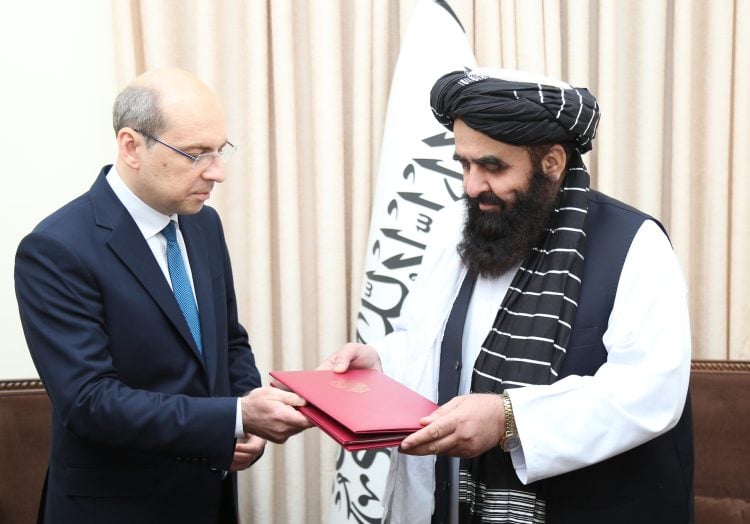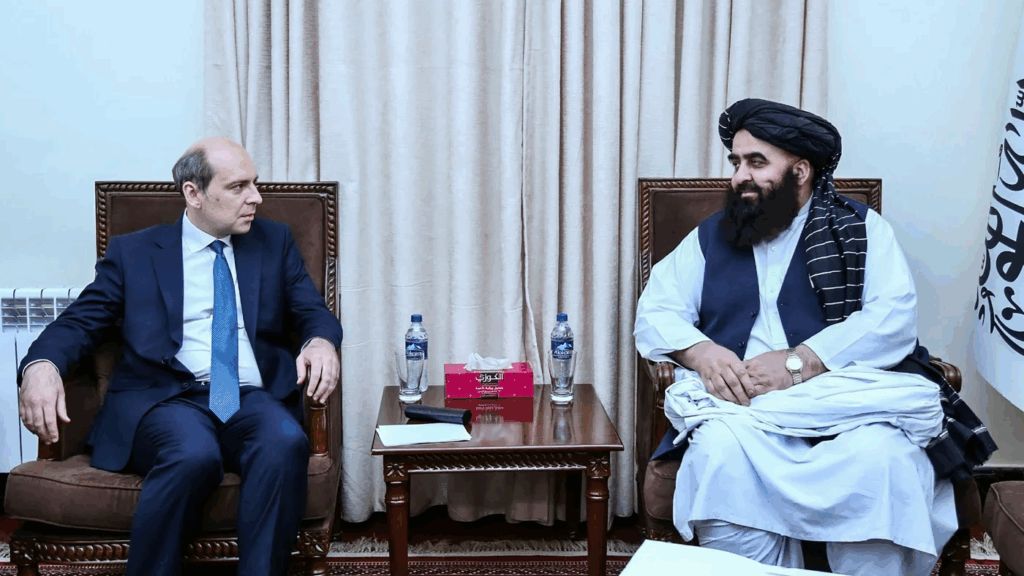Review of Afghanistan Developments
On the evening of Thursday, July 12, 2025, the Ministry of Foreign Affairs of the Taliban government issued a statement indicating that Russian Ambassador Dmitry Zhirnov, during a meeting with Amir Khan Mottaqi, “formally communicated the decision of the Russian government to recognize the Islamic Emirate of Afghanistan by the Russian Federation.” Additionally, the Russian Ministry released a statement expressing the belief that the formal recognition of the Islamic Emirate of Afghanistan will enhance the development of bilateral and constructive cooperation between the two nations across various sectors. Consequently, Russia became the first country to recognize the Taliban government.
A look at Moscow’s long journey to recognize the Taliban government
Russia’s recognition of the Taliban administration should be regarded as the outcome of a process that Moscow undertook with strategic intent and patience. During the initial Taliban regime, Moscow backed the anti-Taliban coalition and even contributed to the overthrow of the Taliban government post-9/11 by allowing the use of its airspace. However, a few years into the US involvement in Afghanistan, Russia recognized that geopolitical shifts were occurring due to NATO’s presence near Central Asian nations, which could be harmful to its interests. Consequently, Moscow, while reducing its relations with the US-supported government, initiated covert communication channels with the Taliban.
In the concluding years of the republican government, Russia entered a new stage by initiating the Moscow format, aiming to harmonize the policies of neighboring countries regarding Afghanistan. It can be asserted with certainty that, among the various regional and international efforts concerning Afghanistan, the Moscow format has emerged as the most consistent and effective initiative or process. The Moscow format significantly contributed to fostering international engagement with the Taliban prior to their ascension to power.
Another significant action that can be regarded as the foundation for Russia’s recognition of the Taliban government was the delisting of the Taliban from the roster of terrorist organizations. When Moscow made this decision, the “Review of Afghanistan Developments ” anticipated in a memorandum that the Taliban’s removal from the terrorist list should be viewed as a proactive measure by Russia, suggesting that Russia would extend recognition to the Taliban government ahead of other nations when the appropriate moment arrived. This indeed occurred, and Russia proceeded to recognize the Taliban government.
The triumph of the Russian diplomatic system over their security system
A thorough analysis of the Russian stance on Afghanistan uncovers two conflicting perspectives. The Russian security services, driven by specific objectives, maintained a negative and apprehensive outlook towards the Taliban government, whereas the nation’s diplomatic service, with Zamir Kabulov playing a pivotal role, adopted a positive and collaborative stance towards the Taliban government.
Russian security officials have consistently highlighted in their communications the threat posed by ISIS Khorasan and other terrorist organizations, such as the Islamic Movement of Uzbekistan, potentially emanating from Afghanistan. For instance, just under a month ago, Alexander Bortnikov, the head of the Russian Federal Security Service, declared at the CIS security summit in Moscow that ISIS-K activities in Afghanistan had escalated and that the leaders of terrorist factions were relying on militants operating within Afghanistan.
In this competition, the Russian diplomatic apparatus successfully asserted its perspective and recognition the Taliban government. As reported in the news, the decision to recognize the Afghan government was made by Vladimir Putin, following a proposal from Russian Foreign Minister Sergei Lavrov.
Mutual recognition instead of collective recognition
The recognition of the Taliban government by Russia is significant when viewed through the lens of international protocols. Although many analysts and even the diplomatic entities of various countries anticipated that any potential recognition of the Taliban government would occur via an international or possibly regional agreement, in reality, this recognition was pursued on an individual and bilateral basis.
Taking into account Russia’s influence and standing within the Security Council and the international framework, it can be asserted that Russia’s recognition of the Taliban government marks the commencement of a trend for other nations to recognize the Islamic Emirate on a bilateral basis. Consequently, it is reasonable to anticipate that other regional countries, particularly those with significant engagements with the Taliban government, will follow Russia’s example and pursue bilateral recognition rather than utilizing multilateral channels.
Central Asian nations are anticipated to take similar actions, primarily due to their dependence on Russia and their significant involvement with the Taliban regime. Among these nations, Uzbekistan and Kazakhstan are expected to lead the way. Similar to Russia, Kazakhstan has excluded the Taliban from its designation as a terrorist organization, which may indicate a step towards formal recognition.

The impact of Russia’s actions at the regional and global levels
Russia’s recognition of the Taliban government merits analysis and examination from a geopolitical standpoint. Through this action, Russia aims to enhance its influence and stability in the surrounding region. This action should be regarded as a significant step in the trajectory that Russia initiated following NATO’s involvement in Afghanistan and the threat of encirclement by this military alliance. Consequently, Moscow is likely attempting to integrate Afghanistan into its Eurasian domain from a security viewpoint, and as a result, its policies and strategies regarding Afghanistan will differ from those previously adopted.
- From a global standpoint, Russia’s recognition of the Taliban government ought to be regarded as a step towards a new world order. In this emerging multipolar world order, each pole aims to draw in more satellites, particularly focusing on nations with elevated geopolitical, geostrategic, and geo-economics significance. Afghanistan’s strategic geographical position, serving as a link between South Asia and Central Asia, along with its centrality within various security contexts, presents compelling and adequate justifications for Russia to engage with this nation.
This action by Russia is likely to provoke a response from the United States and other Western nations. However, the situation in Ukraine compelled Moscow to take the initiative in order to capitalize on the power vacuum in Afghanistan and to avert it from turning into a base for another major conflict. Analyzing the potential response from the Western alliance warrants a thorough discussion on its own, yet it is conceivable that a scenario of ‘Afghanistan replacing Syria’ might be contemplated.
Related articles
Russia’s Interactive Policy Towards the Taliban
Russia’s perspective on Afghanistan and Taliban
Alarm bells ringing for opponents of the Taliban government
Russia’s recognition of the Taliban government will undoubtedly be perceived as a setback for those individuals and factions that oppose the Taliban, particularly if this trend is followed by other nations in the region and beyond due to pressing circumstances. The adversaries of the Taliban have failed to establish a consensus regarding the narrative, singular objective, and future of the Afghan governance system over the past four years. Rather than grasping the on-ground realities and the dynamics of the international system, these opponents have engaged in misguided displays of triumph and rhetoric. Most significantly, they placed their hopes on the United States, even proposing to cede the Bagram military base to facilitate this aim; however, the actual situation on the ground and the international landscape told a different story.
Russia’s recognition of the Taliban government ought to serve as a crucial reminder for the opposition to prioritize dialogue through a regional framework before they forfeit any remaining chances. The Taliban administration’s influence and status at the negotiation table have reached unprecedented levels, and it is imperative for the opposition to pursue intra-Afghan discussions before they lose further opportunities.

















